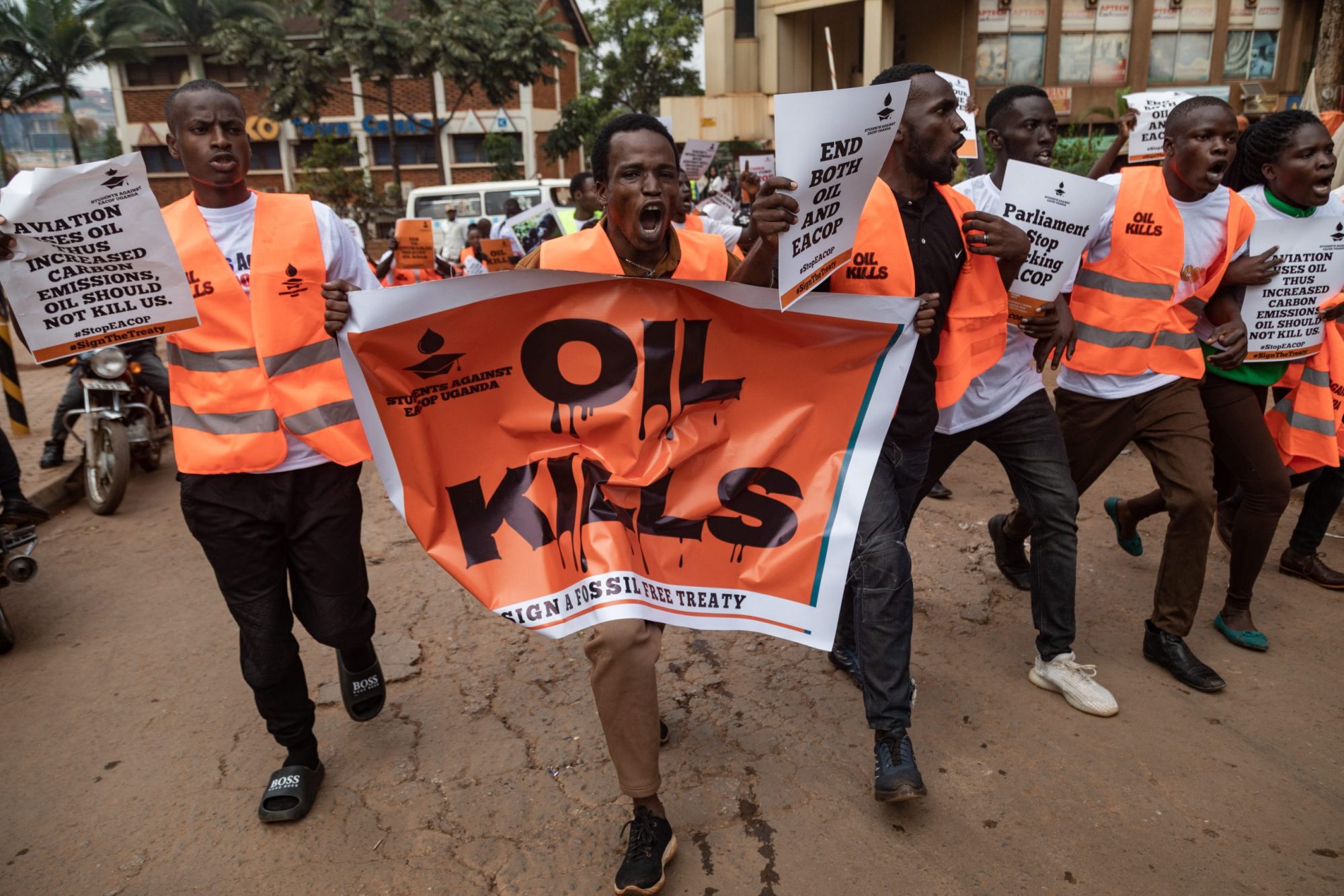
This story originally appeared in Common Dreams on Aug. 26, 2024. It is shared here with permission under a Creative Commons (CC BY-NC-ND 3.0) license.
Police and soldiers from Uganda’s U.S.-trained army cracked down on demonstrators at two Monday protests against the East African Crude Oil Pipeline, continuing the globally condemned oppression of EACOP opponents.
In the capital city of Kampala, where protesters tried to march on Parliament and the Chinese Embassy “there are 21 people arrested, they included 19 males and two females,” defense attorney Samuel Wanda told Agence France-Presse. They were taken to the city’s central police station and charging details were not yet available. Eight protesters would be directly impacted by the project.
As AFP noted, the China National Offshore Oil Corporation has an 8% stake in EACOP, which is set to carry crude nearly 900 miles from Uganda’s Lake Albert oilfields to the port of Tanga in Tanzania. Ugandan and Tanzanian state-owned companies each have a 15% stake, and the remaining 62% is controlled by the France-based multinational TotalEnergies.
“The arrest of Stop EACOP activists in Kampala today is an attack on democracy and the right to protest,” said climate campaigner and environmental consultant Ashley Kitisya on social media. “We condemn this crackdown and call for the immediate release of all detained activists. Peaceful voices demanding justice must not be silenced. #StopEACOP.”
Fridays for Future Uganda declared that “the arrest of climate activists against EACOP is a blatant move to silence crucial advocates for change.”
“Many affected are misled and unaware of the true risks,” the youth-led group added. “We must oppose this injustice and demand EACOP’s immediate halt to protect people and the environment.”
Hundreds of peaceful pipeline opponents—including breastfeeding mothers—also gathered in Hoima City, according to the Kampala-based Monitor. They were at a Kitara Secondary School (SS) and planned to demonstrate at regional EACOP offices but “were surrounded by heavily armed police” and Uganda Peoples’ Defence Forces (UPDF) soldiers “who foiled the protest.”
As the outlet noted last year, declassified U.S. State Department data shows that from 2019-21, Uganda received $8.5 million in military training assistance from the United States, and from 2012-16, the African country got grants for equipment worth $21.9 million .
On Monday, Christopher Opio told Hoima Resident City Commissioner Badru Mugabi that the project affected persons (PAPs) he represents had not received a government response to an April petition “so, we decided to say we can again put our concerns in writing. Today, we were taking our petition to the offices of EACOP, and Petroleum Authority of Uganda (PAU) peacefully.”
As the Monitor detailed:
Mugabi responded saying: “If you have a court case and the court has not heard you, please come to our offices. We shall put these courts to order, or we shall appeal to their supervisors. But walking to these offices will not change the status quo legally.”
Later, Mugabi selected a few PAPs’ representatives and escorted them to deliver their petition to the offices of EACOP and PAU while the rest of the aggrieved locals were left at Kitara SS under tight security.
In a series of social media posts, the StopEACOP campaign called out law enforcement for blocking the peaceful protest in Hoima, highlighting the threats and intimidation faced by PAPs and local climate activists.
Despite the oppression in Uganda, protests are planned in Tanzania on Thursday, according to the global climate organization 350.org.
“The EACOP project threatens local communities, water resources, biodiversity, and efforts to curb climate change while providing little to benefit ordinary Ugandan and Tanzanian people,” the group said Monday. “Already, tens of thousands of people along the pipeline’s route and near its associated oil drilling sites have been forcibly displaced, losing their land, livelihoods, and traditional ways of life. Many have been relocated to inadequate homes on infertile land, making it impossible to grow crops or sustain their families. Others have received inadequate compensation or none at all, leaving them unable to rebuild their lives.”
“Additionally, community members and activists face escalating threats, including violence, intimidation, arrests, harassment, and even abductions for resisting the project,” 350 added. “Impacted communities and land, human rights, and environmental defenders in the project’s host countries are taking to the streets to demand an end to EACOP and justice for the harm that has already been caused.”


